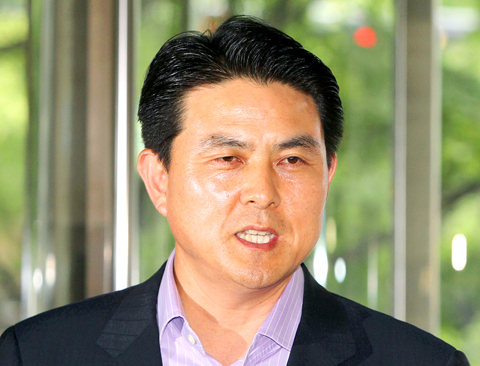South Korea’s reformist prime minister-designate and two other ministerial nominees stepped down yesterday amid allegations of corruption, rocking South Korean President Lee Myung-bak’s plans to boost ruling party morale.
Lee had picked Kim Tae-ho as prime minister earlier this month, but after a heated confirmation hearing last week in which the opposition called into question his qualifications and ethics, Kim gave up his quest for the post.
“I have resigned as the prime ministerial nominee with the thought that I should not cause any more trouble to the president’s governance,” Kim told a media conference in Seoul. “During the confirmation process, I sincerely acknowledged my many shortcomings. Although I feel some of the allegations were a bit unfair, I accept them as they were caused by my insufficiencies.”

PHOTO: AFP
Two other Cabinet nominees, for the posts of knowledge economy and culture, also quit over corruption allegations.
Kim, 47, had been in line to become the youngest prime minister in decades, and observers saw his selection as a sign he was also being groomed as a presidential candidate for the ruling Grand National Party at the next election in 2012.
Prime ministers in South Korea traditionally take on a more bureaucratic and administrative role. Cabinet reshuffles occur frequently and often involve the prime minister.
Lee ditched half of his Cabinet mid-way through his five-year term because he wanted to give his government a more youthful and vigorous look as he pushes ahead with reforms.
Kim had been earmarked to replace former prime minister Chung Un-chan, who quit last month to take responsibility for the government’s failure to win parliamentary approval for a key development project.
Lee’s plans for job creation and reform have been blocked for months in parliament because of a row over plans to move some ministries to a new administrative capital.

LONG FLIGHT: The jets would be flown by US pilots, with Taiwanese copilots in the two-seat F-16D variant to help familiarize them with the aircraft, the source said The US is expected to fly 10 Lockheed Martin F-16C/D Block 70/72 jets to Taiwan over the coming months to fulfill a long-awaited order of 66 aircraft, a defense official said yesterday. Word that the first batch of the jets would be delivered soon was welcome news to Taiwan, which has become concerned about delays in the delivery of US arms amid rising military tensions with China. Speaking on condition of anonymity, the official said the initial tranche of the nation’s F-16s are rolling off assembly lines in the US and would be flown under their own power to Taiwan by way

OBJECTS AT SEA: Satellites with synthetic-aperture radar could aid in the detection of small Chinese boats attempting to illegally enter Taiwan, the space agency head said Taiwan aims to send the nation’s first low Earth orbit (LEO) satellite into space in 2027, while the first Formosat-8 and Formosat-9 spacecraft are to be launched in October and 2028 respectively, the National Science and Technology Council said yesterday. The council laid out its space development plan in a report reviewed by members of the legislature’s Education and Culture Committee. Six LEO satellites would be produced in the initial phase, with the first one, the B5G-1A, scheduled to be launched in 2027, the council said in the report. Regarding the second satellite, the B5G-1B, the government plans to work with private contractors

‘OF COURSE A COUNTRY’: The president outlined that Taiwan has all the necessary features of a nation, including citizens, land, government and sovereignty President William Lai (賴清德) discussed the meaning of “nation” during a speech in New Taipei City last night, emphasizing that Taiwan is a country as he condemned China’s misinterpretation of UN Resolution 2758. The speech was the first in a series of 10 that Lai is scheduled to give across Taiwan. It is the responsibility of Taiwanese citizens to stand united to defend their national sovereignty, democracy, liberty, way of life and the future of the next generation, Lai said. This is the most important legacy the people of this era could pass on to future generations, he said. Lai went on to discuss

MISSION: The Indo-Pacific region is ‘the priority theater,’ where the task of deterrence extends across the entire region, including Taiwan, the US Pacific Fleet commander said The US Navy’s “mission of deterrence” in the Indo-Pacific theater applies to Taiwan, Pacific Fleet Commander Admiral Stephen Koehler told the South China Sea Conference on Tuesday. The conference, organized by the Center for Strategic and International Studies (CSIS), is an international platform for senior officials and experts from countries with security interests in the region. “The Pacific Fleet’s mission is to deter aggression across the Western Pacific, together with our allies and partners, and to prevail in combat if necessary, Koehler said in the event’s keynote speech. “That mission of deterrence applies regionwide — including the South China Sea and Taiwan,” he